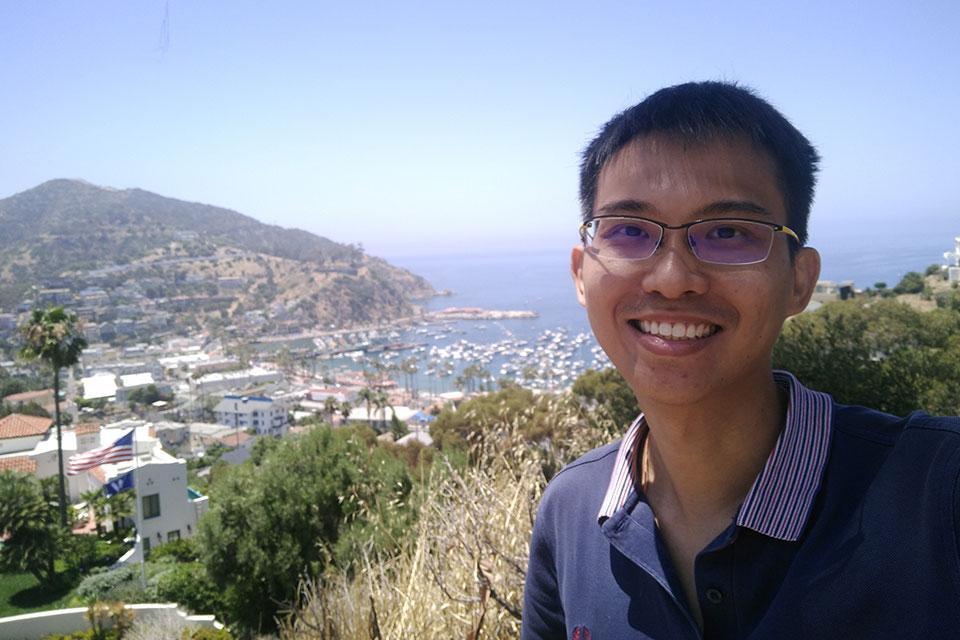Wilber Lim is a theoretical physics graduate student at the Department of Physics. Every year, the department welcomes some 100 graduate students – some of the brightest minds in the world – to work alongside established experts and conduct authoritative research with an international audience. Our graduate students bring to their studies and their science a fresh perspective, an insatiable curiosity and a passion to further society’s understanding of our Universe.
Wilber is an OXPEG (Oxford Physics Endowment for Graduates) scholar; OXPEG provides scholarships and flexible support for graduate students in the Department of Physics. So what is it like being a graduate student and how do they spend their time? We take a look at a day in the life of Wilber Lim who is looking at the physics of inhomogeneous DNA under twist and tension…
8.30am
Checking results from my simulations of DNA
My early mornings are typically spent on checking the results from my computer simulations as well as running new simulations to test the theory that we are working on. My research focuses on how DNA responds structurally and topologically to external physical stresses, and this is not something I can easily carry out on pen and paper – though from time to time, I will still need those to sketch out equations that can help me understand the simulation results. A large number of computers is required to work out the calculations I need for my research. Fortunately, the theoretical physics sub-department has a dedicated computer cluster that allows me to run computationally challenging and time-consuming simulations.
11am
Coffee break with fellow students and professors
Even though I do not take coffee, it is good to be able to catch up with everyone and find out how they are doing – even over Zoom!
11.30am
Class on mathematical and theoretical physics
While it is not compulsory for us as DPhil students in Theoretical Physics to take taught classes, we are often encouraged by our supervisors to attend classes that may be relevant to our research work. Sometimes, we also attend classes out of pure intellectual curiosity! I personally enjoy the rich exchanges between the lecturers and the students in these classes.
1pm
Lunch with fellow graduate students
In ‘normal’ times, another common social activity that we have as graduate students is to have lunch or dinner together in one of the colleges that we belong to – it’s a fantastic opportunity for us to explore the many colleges in Oxford and I look forward to being able to do it again soon.
2pm
Theory Colloquium
There is a wide range of seminars that cater to different specialisations within physics, but there is one rather special seminar called the Theory Colloquium that all theoretical physicists are highly encouraged to attend, regardless of their own field of expertise or research. Speakers from around the world are invited to talk on topics that are often vastly different from my own research studies in DNA - string theory, cosmology, pure mathematics - just to name a few. The specialist knowledge and the techniques they use to advance their field of research may not be directly applicable to me now, but these are things that I keep at the back of my head, as who knows, there might be a moment in my research journey where I would need to put these things to good use.
3.30pm
Meeting my research collaborators
One of the things that I appreciate here in Oxford is that as graduate students we do not work in silos. Today, I met virtually with my research collaborators in chemistry to discuss progress in our joint projects. The physical theories that we develop to describe DNA in a biological setting can also be extended to fields that are of interest to other research groups, such as DNA nanotechnology and nanostructures.
5.30pm
Huddle with my supervisor
This is a quick check-in session with my supervisor to update him on my progress and to flag out interesting observations that I've made from the simulation results. When not working from home, I am based in the fantastic new Beecroft Building and one of the brilliant things about it is that it has numerous open areas for such discussion, with large blackboards for us to work out complex mathematical equations and sketch out new plans and ideas.
‘I consider myself fortunate to be able to work on new fundamental physics that is also real-world relevant. This would not be possible without an OXPEG studentship.’
Wilber Lim, OXPEG scholar

